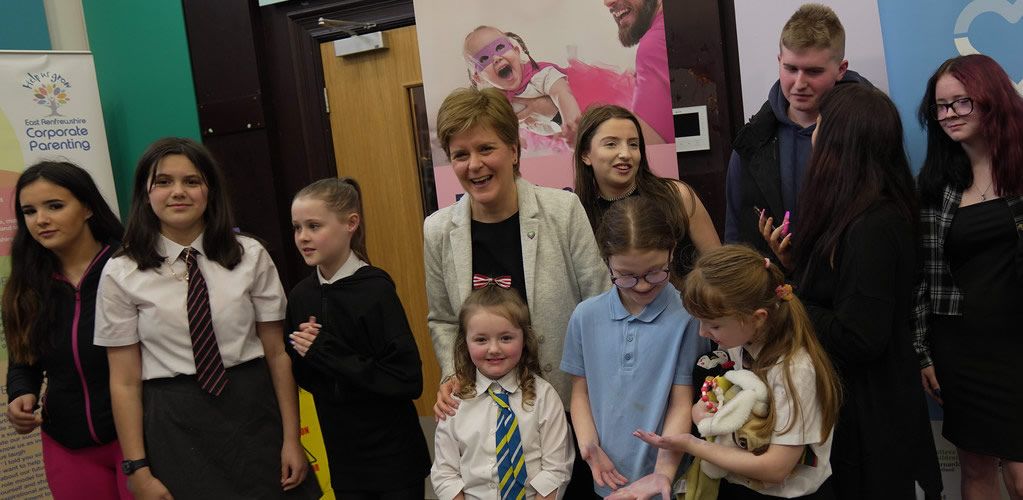Nicola Sturgeon resigns: The end of an era
After 8 years as First Minister, Nicola Sturgeon resigns with dignity and maturity to promote unity and leave behind a legacy of approval ratings her opponents can only dream of. A shock to many, her departure marks the end of an era in Scottish politics.

After 8 years as First Minister, Nicola Sturgeon resigns with dignity and maturity to promote unity and leave behind a legacy of approval ratings her opponents can only dream of. A shock to many, her departure marks the end of an era in Scottish politics.
T he only story in town in Scottish politics is the sudden resignation of Nicola Sturgeon as First Minister. It’s bloody typical that this happens when I am trying to enjoy a few days’ rests.
The haters have finally got what they wanted, but even for those who dislike her, there can be no doubt that Nicola Sturgeon has been a towering figure in Scottish politics, and even after more than eight years as First Minister, she still enjoys approval ratings that her opponents can only dream of, leaving Anas Sarwar, Douglas Ross, and Alex Salmond trailing a long, long way behind her.
There had been some rumours in the past few days that she was about to resign, but the announcement, when it came, was a shock to most. It is very much the end of an era in Scottish politics.
At a press conference to announce her resignation, the woman we must now call the out-going First Minister categorically denied that her decision had anything to do with recent controversies such as the heated and often bad-tempered debate about Gender Recognition certificates and refused to be drawn on questions about whether it had anything to do with the ongoing police investigation into the party’s finances. She insisted that her decision had nothing to do with short-term political pressures, noting that she had dealt with immense political pressures in the past. There are indeed plentiful examples, such as the Salmond trial and subsequent investigation into what she did or did not know, and dealing with the COVID pandemic. Such pressures, she noted, are very much part and parcel of the job.
She hinted in her resignation speech at the immense personal toll that being in such a high-pressure job takes on an individual on a human level. Of course, being in a high-profile political job means that your actions and views become open to public scrutiny and criticism, that is part and parcel of a functioning democracy. However, Nicola Sturgeon has been subjected to an intense, constant, and unceasing barrage of criticism, not all of it justified, and much of which has been unnecessarily and unpleasantly personal, some of which has verged into deeply nasty irrational abusiveness going way beyond anything that’s the normal back and forth of politics.
According to some, Nicola Sturgeon is simultaneously a misogynist and a lesbian. This kind of attack is bad enough when it comes from your political opponents, but psychologically it is far more difficult to shrug off when it comes from those who are supposed to be on the same side as you are, even more so when your job means that the normal coping mechanisms the rest of us enjoy are denied to you. She can’t easily go for a quiet walk in the park or meet with friends in a cafe for laughs and giggles. But she has dealt with those attacks with a personal dignity that is alien to those who resort to crude personal abuse and mud-slinging against her.
Nicola Sturgeon certainly recognised that she has come to embody division and divisiveness, and I suspect that she was not referring to the divisions between die-hard British nationalists and independence supporters, but rather to the divisions within the independence movement.
As we approach a critical moment in the campaign for independence, a historic decision on how to proceed in the face of the anti-democratic intransigence of the Anglo-British Brexit parties, the need for unity within the independence campaign has never been more vital. It is to Nicola Sturgeon’s immense credit that she has the personal and political maturity to recognise that that much-needed unity cannot be achieved while she remains the leader of the SNP and First Minister of Scotland. That’s a maturity that is sadly lacking in certain other individuals. But one thing is certain, those amongst her critics who decried her as a careerist have been comprehensively proven wrong.
There will now be a contest for her replacement, the details of which will be announced in the coming days. Nicola Sturgeon will remain First Minister and party leader until her replacement is in place, which we must assume will have happened before the party’s special conference to decide the way ahead for a public vote on independence in the face of Sunak and Starmer’s denial of Scottish democracy.
But those on the pro-independence side who have devoted their time and energy to demanding Nicola Sturgeon’s removal rather than building the case for independence should be very careful indeed what they have wished for. Nicola Sturgeon had made the case for using the next UK General Election as a de facto referendum of her own. Her successor, whoever that is, may not feel the same obligation.
There is no obvious successor. That is not to say that there is a shortage of talent, but none of those who are likely to throw their hat into the ring enjoy a clear advantage at this early stage. Finance Secretary Kate Forbes has been mentioned, as have Angus Robertson and John Swinney. One thing is certain however, it is now less likely that there will be an early Holyrood election used as a referendum on independence. Whoever wins will have very big boots to fill. The new leader will instead first and foremost wish to secure their position and settle into their post and get on with the crucial task of reuniting the independence movement. They will be highly reluctant to precipitate an early Holyrood election to be used as a de facto independence referendum until they have got the measure of their new job and of their opponents in the Labour and Conservative parties.
However, we are now moving into a new era, both for the independence movement and for Scotland as a whole. You can bet your house that whoever succeeds Nicola Sturgeon will very quickly become a new object of the irrational hatred of the we’re not nationalists we’re British types, who will devote themselves to getting #RESIGN(INSERTNAMEHERE) trending on social media, but we can hope that her stepping down will give the independence movement the opportunity it needs to come back together and to focus on challenging the real opponents of independence, those British politicians who lie to and deceive the people of Scotland about the nature of this so-called union and deny Scottish democracy. British nationalist rejoicing will be short-lived.
Scottish independence is not and never was about Nicola Sturgeon, just as it was never about Alex Salmond. It’s about all of us and our hopes and dreams for a better, fairer country. Nicola Sturgeon has stepped away in order to give the rest of us the chance to come together and concentrate on making the case for that better, fairer Scotland. Let’s seize that opportunity with both hands.


|

|

|
— AUTHOR —

|
▫ Wee Ginger Dug, also known as Paul Kavanagh. Blogger who writes and talks about UK Politics and Scottish Independence. |
Sources
▪ Text: This piece was originally published in Wee Ginger Dug’s blog and re-published in PMP Magazine on 20 February 2023, with the author’s consent. | The author writes in a personal capacity.
▪ Cover: Flickr/Scottish Government. (Licensed under a Creative Commons Attribution-ShareAlike 4.0 International License.)







[Read our Comments Guidelines]